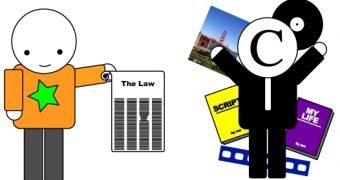Yesterday marked a big step in copyright protection of open source licensed software, as the U.S. Court of Appeals for the Federal Circuit ruled that an open source software developer can claim copyright infringement, even if the work is released under a free software license.
The appellate court reversed a district court ruling that decided that copyright infringement claims did not apply in this case. Robert Jacobsen developed software for use with model trains, and released it under the Artistic License for anybody to download and use. He then pursued copyright infringement claims against a company that used part of his work, without even giving him credit, for the creation of a commercial software package.
The lower court decided that Jacobsen's copyright infringement claims did not apply, and recommended him to pursue a breach of contract claim. His lawyer, Victoria Hall, explained that the difference between the two was quite significant in terms of effects, with those of copyright infringement being much more severe.
The Artistic License qualifies as a free software license and was approved by the Free Software Foundation. It is used by several important projects, with Perl being the most notable. The problem with such licenses is that, in practice, they are viewed more like contracts, which makes breaking their terms not necessarily copyright infringement. With some of them, like the GNU GPL, it generally does, but with many others like the Creative Commons ones, it is still undecided. This is what makes this ruling so important, at least in the U.S. It could give developers more confidence to use such licenses for their projects while retaining some level of protection.
This ruling could also change the way creative works are shared, as the current basic practice for licensing is to ask the owner for permission before use. In general, this takes time and complicates things as it's done on a per-project basis. Licenses like Creative Commons aim at allowing creative works owners to define the terms of use for different levels of usage in advance.
Respected lawyer Lawrence Lessig noted on his blog that "in non-technical terms, the Court has held that free licenses such as the CC licenses set conditions (rather than covenants) on the use of copyrighted work. When you violate the condition, the license disappears, meaning you're simply a copyright infringer," and defined this ruling as "important clarity and certainty by a critically important US Court."

 14 DAY TRIAL //
14 DAY TRIAL //